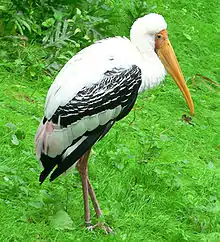황새
Korean

Etymology
First attested in the Hunmong jahoe (訓蒙字會 / 훈몽자회), 1527, as Middle Korean 한새 (Yale: hansay).
From 하— (ha-, “big; great”, obsolete) + —ㄴ (-n) + 새 (sae, “bird”), and possibly contaminated by 黃 (hwang, “yellow”). For a similar change, see 황소 (hwangso, “bull”).
Pronunciation
- (SK Standard/Seoul) IPA(key): [ˈɸwa̠(ː)ŋsʰɛ] ~ [ˈɸwa̠(ː)ŋsʰe̞]
- Phonetic hangul: [황(ː)새/황(ː)세]
- Though still prescribed in Standard Korean, most speakers in both Koreas no longer distinguish vowel length.
| Romanizations | |
|---|---|
| Revised Romanization? | hwangsae |
| Revised Romanization (translit.)? | hwangsae |
| McCune–Reischauer? | hwangsae |
| Yale Romanization? | hwāngsay |
Noun
황새 • (hwangsae)
- oriental stork (Ciconia boyciana)
- (~속(屬)) any of the birds in the genus Ciconia
- (~과(科), ~목(目)) stork (family Ciconiidae, order Ciconiiformes)
Derived terms
- 황새걸음 (hwangsaegeoreum, “long stride”)
This article is issued from Wiktionary. The text is licensed under Creative Commons - Attribution - Sharealike. Additional terms may apply for the media files.